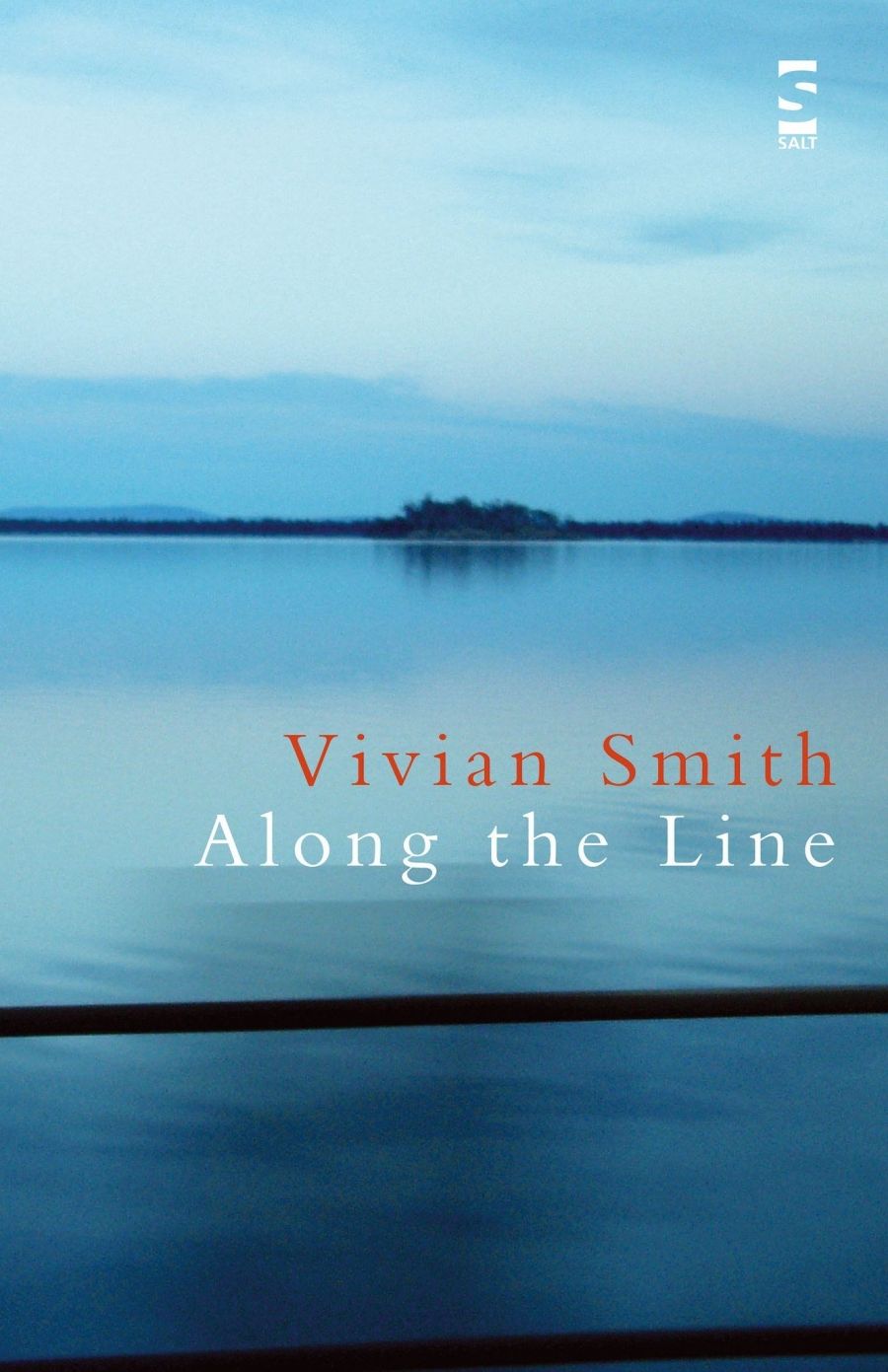
- Free Article: No
- Review Article: Yes
- Online Only: No
- Custom Highlight Text:
There are not many ways, I imagine, in which Vivian Smith puts one in mind of Walt Whitman, but one which occurs to me is that Smith’s successive volumes, at least since Tide Country (1982), have been, like Leaves of Grass (1855), a work in progress, in which previous poems reappear, sometimes in modified form, and new work is added, so that the whole corpus is re-presented in different ways over time. Along the Line is the latest, and welcome, incarnation of Smith’s oeuvre.
- Book 1 Title: Along The Line
- Book 1 Biblio: Salt, $29.95 pb, 118 pp
That voice is characteristically restrained: He doesn’t shout or hector or say too much. It gains the reader’s attention by speaking quietly. Some words from ‘Colonial Poet’ could be applied to Smith himself: ‘poetry that brims and never spills’; ‘A language … / as clean as stones … / lines as strict and spare as summer hills’.
Smith’s preoccupations include recollections of the places of childhood and youth, minute in detail and without sentimentality; recollections of friends from former times, as some of the poems’ titles attest, invariably recalled with affection and generosity; and subsequent meetings. There are contrasting evocations of Hobart and Sydney. The intersections of history with the individual are treated, as in ‘History’, about the end of the Cold War, and glancingly in ‘Letter from Sydney’, where the tide toys with storm-blown leaves in a bay ‘as bombs are being dropped on Kosovo’. Smith can be quietly funny too: one of the new poems, ‘Traveller’s Tale’, is an amusing account of the poet’s being kept awake in a hotel by the lovers in the next room. Or so he thinks. I won’t give away the ending.
But it is the close attention to, and evocation of, the natural world that strike me most about Smith’s poetry. The poems are often like pools of quiet observation (in both senses) which, though small in scale, have larger implications, and, though simple in expression, contain complexities. ‘Driven here by dry and traceless need, / need to be silent, simply to be alone, / I half-observe …’ he begins ‘Beyond this Point’, though Smith does himself a disservice in saying he only half-observes. ‘Looking is such a marvellous thing,’ Rilke said, ‘of which we know little; as we look, we are directed wholly outside ourselves.’ Or as Matisse put it, ‘To see is itself a creative operation, requiring effort.’ The descriptive is never merely descriptive; it can lead to discoveries:
A worn rock drags the light down through the sand,
casting a shadow finer than a wrist.
(‘Beyond this Point’)
a moth freighted with fragilities
(‘Night Life’)
The coral trees begin to lose their leaves
letting through the huge waste of the sky
(‘Late May: Sydney’)
Smith seems to look on the world with half-disbelieving wonder. But I am not sure that I would characterise Smith’s poetry as having a ‘sense of transcendence’, as one of the cover notes does. It seems to me more like a heightened awareness of what is within the world than of something beyond it. ‘The inhuman has such perfect clarity’, if we can see it. Given this visual quality, it is not surprising that a number of poems are either dedicated to painters or are about paintings and exhibitions.
I will offer a few words about versification. Smith overwhelmingly favours iambic pentameter, and I like to note his ways of varying it. Often he will intermingle shorter lines, as in ‘My Morning Dip’, where the fourth, and rhyming, line of the second stanza is the drastically curtailed ‘the menopause’, with two stresses only, which literally brings one up short. Sometimes subtle disruptions are worked within a line, as in ‘The Room’: ‘They understood her needs, and she, theirs.’ That missing unstressed syllable before ‘theirs’ functions like a musical rest; the reader must pause on ‘she’ or draw it out, which gives an ironic inflection to the line.
Let me conclude my survey of this wonderful book by quoting the end of Anthony Hecht’s ‘The Venetian Vespers’, where the speaker says, ‘I look and look, / As though I could be saved simply by looking …’ Smith’s poetry, you feel, embodies a similar conviction, though the poet himself may not quite believe it.
Can we learn wisdom watching insects now,
or just the art of quiet observation?
(‘Summer of the Lady Birds’)
Perhaps wisdom and the art of quiet observation are not mutually exclusive.


Comments powered by CComment